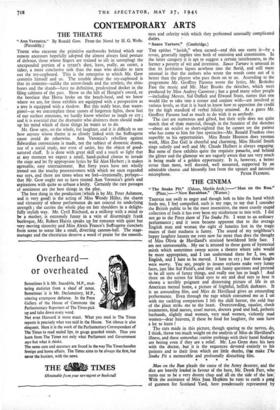CONTEMPORARY ARTS
THE THEATRE
" Ann Veronica." By Ronald Gow. From the Novel by H. G. Wells. (Piccadilly.) THOSE who excavate the primitive earthworks behind which our remote ancestors hopefully adopted the almost always fatal posture of defence, those whose fingers are trained to sift in sarcophagi the unexpended portion of a tyrant's dust, have, really, an easier, a tidier, a more conclusive task than the man who decides to turn out the toy-cupboard. This is the enterprise to which Mr. Gow commits himself and us. The trouble about the toy-cupboard is that its contents—unlike the arrow-heads and the armlets, the shin- bones and the shards—have no definitive, predestined docket in the filing cabinets of the past. Show us the hilt of Hengist's sword, or the bootlace that Horsa broke on the beach-head, and we know where we are, for these exhibits are equipped with a perspective as a tree is equipped with a shadow. But this teddy bear, that water- pistol—as we contemplate these causes of forgotten fights, these foci of our earliest emotions, we hardly know whether to laugh or cry ; and it is essential that the dramatist who disinters them should make up his mind which of these things he wants us to do.
Mr. Gow opts, on the whole, for laughter, and it is difficult to see how anyone whose theme is so closely linked with the Suffragette cause could do otherwise. Ann Veronica's rebellion against Edwardian conventions is made, not the subject of domestic drama, nor of a social study, nor even of satire, but the object of good- natured chaff. It is done with great skill and a touch so light that at any moment we expect a small, hand-picked chorus to invade the stage and let fly appropriate lyrics by Sir Alan Herbert ; it makes agreeable, easy entertainment. But forty years have not wholly ironed out the touchy possessiveness with which we once regarded our toys, and there are times when we feel—irrationally, perhaps— that Mr. Gow ought not to have treated Ann Veronica's griefs and aspirations with quite so urbane a levity. Certainly the rare passages of sentiment are the best things in the play.
The best thing in the production (which is by Mr. Peter Ashmore, and is very good) is the acting of Miss Wendy Hiller, the charm and virtuosity of whose performance do not conceal its underlying strength ; she carries the whole play on her shoulders in a delight- fully stylish way. Mr. Cyril Ritchard, as a milksop with a mind to be a masher, is extremely funny in a vein of disarmingly frank burlesque, Mr. Robert Harris speaks up for romance with quiet but very moving sincerity and Miss Alexis France's Suffragette ricochets from scene to scene like a small, diverting cannon-ball. The stage- manager and the electrician deserve a word of praise for the smooth-
ness and celerity with which they performed unusually complicated duties.






































 Previous page
Previous page